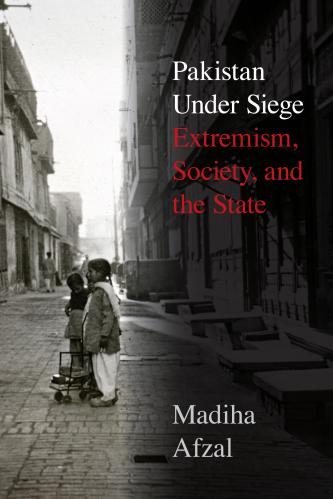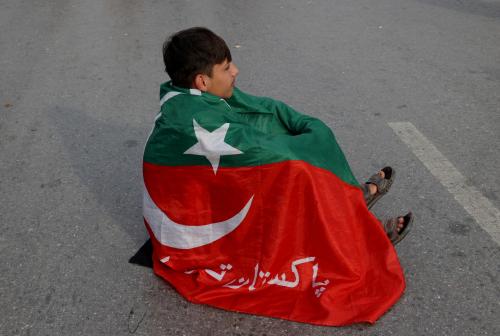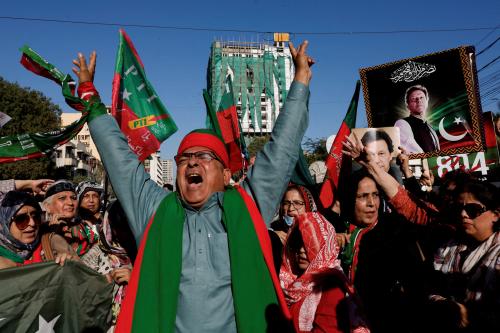Before he became Pakistan’s prime minister, Imran Khan wasn’t known as a leader who stood up to the country’s hardliners. As an opposition politician in the last decade, at times that were politically opportune for him, he echoed their narratives. At the height of the Tehreek-e-Taliban Pakistan’s (TTP) insurgency against the Pakistani state from 2012 to 2014, he gave voice to the problematic, naïve rhetoric that Taliban attacks were a response to drone strikes, or that they were part of a conspiracy to derail the state. He claimed that the TTP engaged in terrorist attacks to protest the Pakistani state’s—in his view misguided—alliance with the United States in its war in Afghanistan. “Not our war,” he would say, in line with his brand of sovereign-nationalism vis-à-vis America. He wasn’t Pakistan’s only leader saying this, but he was among its most vocal.
Yet in his months as prime minister, Khan has taken a stand twice against the country’s hardliners, only to pull back in the face of Islamist backlash. The party that poses the biggest threat to him is the Tehreek-e-Labaik Pakistan (TLP), a hardline group turned political party that derives its power from a single issue, namely ensuring the complete implementation of Pakistan’s harsh blasphemy laws (under which blasphemy is punishable by death). The TLP won no seats in Pakistan’s National Assembly in July 2018, but exercises huge street power.
A monumental decision, and a big step back
The TLP first shot to prominence in 2016, through its protests over the hanging of Mumtaz Qadri, the man who had assassinated Punjab’s governor, Salmaan Taseer, in 2011. Qadri, one of Taseer’s elite force security guards, shot the governor to death in broad daylight over Taseer’s support of Asia Bibi, a Christian woman then on death row for blasphemy (a charge Bibi vehemently denies).
Last week, in a monumental decision, Pakistan’s supreme court overturned Asia Bibi’s death penalty and acquitted her of blasphemy, saying her conviction was based on a “concoction incarnate.” In response, the TLP threatened each of Pakistan’s branches of government: urging army officers to revolt against the Chief of Army Staff Qamar Bajwa, saying he was a non-Muslim; inciting violence against the justices of the supreme court by declaring them wajib-ul-qatl (worthy of being killed); and attempting to insult Khan. It then took to the streets in violent protest, burning tires, beating cars, and destroying property.
That night, Prime Minister Khan gave a nationally televised speech that rallied even his toughest critics. He framed his support for the verdict in Islamic terms, defending it as consistent with the constitution—amounting to a narrative defense of a kind that Pakistan has not seen in the face of Islamist backlash. For a country whose constitution declares that no law repugnant to Islam shall be instituted (a clause Khan cited in the speech) and whose penal code punishes blasphemy by death—and whose population has internalized these laws—it was the right speech to give, though to an outsider it may have sounded overly religious. He also said the protesters were taking action inimical to Pakistan’s interests, and harming people’s livelihoods, thus hurting his key mission to improve Pakistanis’ lives. He said that his government would take action against the protesters if they continued to disturb the peace.
Then Khan promptly left for an investment conference in China, hoping for loans to ease Pakistan out of its current economic crisis. He left the situation in the hands of non-prominent ministers (he holds the office of interior minister). The army promptly distanced itself from the supreme court verdict, and indeed from the situation. It had done the same in 2017, when for weeks the TLP protested a tiny change in the oath for parliament surrounding the core Islamic belief that Prophet Muhammad is the final prophet. But the Pakistan Muslim League-Nawaz (PML-N) was in power at that time, and because the army had fallen out with it (due to the PML-N’s attempts at asserting civilian supremacy), its refusal to take action against the TLP protest was perceived as a deliberate attempt to undermine the PML-N. In contrast, Khan’s Pakistan-Tehreek-e-Insaf party (PTI) and the army are thought to be on the same page; still, the army treated the situation offhandedly, basically washing its hands of it, as it does only when it comes to Pakistan’s hardliners (all others who threaten its writ—secular bloggers, Pashtun protesters, investigative journalists—are treated far more harshly).
Appeasement preceded the crackdown, a bad precedent.
Within two days, the PTI government—following the pattern of the previous PML-N government—signed a deal with the protesters, giving in to a key demand that Bibi would not be allowed to leave the country. Now the state cannot guarantee her security without keeping her in a prison cell. The liberals who had rallied behind Khan turned away. Once the protesters disbanded, the government started registering cases against them—over five thousand in just a day—for destroying property and inciting violence. But appeasement preceded the crackdown, a bad precedent.
The cycle of appeasement politics
Khan’s roughly 100-day tenure has been a rollercoaster ride for Pakistan’s liberals—a tiny bunch—who fully expected Khan to cave to extremists, given his past (specifically his goading of the TLP during its 2017 protests, and sometime expressions of sympathy with the TTP). But twice so far, he has confused them, indicating a refreshingly progressive approach initially, only to step back, disappointing them anew, and earning the title “Mr. U-turn.”
In a bold step, he appointed a Princeton professor, Atif Mian—who happened to be Ahmedi, a persecuted religious minority that is declared non-Muslim under Pakistan’s constitution—a member of his Economic Advisory Council. The TLP and other Islamists began a smear campaign against Mian, and, fearing protests, Khan preemptively asked the professor to resign. A Harvard and University College of London professor also resigned in protest, diluting the council’s star power.
Khan’s speech last Wednesday and his subsequent appeasement of Islamists in Bibi’s case fit a similar pattern, albeit at a larger scale and with an actual protest in place. Khanistas, as his supporters are called, claim the government had no choice but to appease. They (and the army) worry about a repeat of the bloodshed following former President Pervez Musharraf’s raid on the militant Red Mosque in 2007, in which 50 madrassa students died. Both say they also worry about a fundamentalist backlash, given that the Pakistan Taliban insurgency officially launched after the Red Mosque raid. But TLP protesters are not barricaded in a mosque, and the state can more easily arrest those destroying property on the streets and publicly inciting violence.
Still, it is unclear that the police and, if needed, the army would fully cooperate with such instructions from the government. As I mentioned, Pakistanis—including those in the police and armed forces—have internalized the country’s blasphemy laws and may thus sympathize with the TLP’s ideology. According to a 2011 Pew poll on religion, fully 75 percent of Pakistanis say they believe Pakistan’s blasphemy laws are necessary to protect Islam in Pakistan (of course, this response may be at least partially driven by fear, given the enormous cost of speaking out against these laws). The same percentage, 75 percent, believes that apostasy deserves to be punished by death. As I show in my book, that percentage remains constant across respondents’ education levels.
In such an environment—fostered entirely by the state over decades—it is hard for any government to take a stand. It is not only that the government is fearful of chaos on the streets and the street power of the mullah. The party in power feels it must appease to preserve political support, something the opposition is all too willing to snatch away. This is baked into Pakistan’s politics, with its balance of weak mainstream parties, obstructionist Islamist parties, and all-powerful military. As a case in point, members of the PML-N, just out of power, and of the secular Awami National Party (ANP) both signed the parliamentary petition against having Mian on the Economic Advisory Council. This time the opposition has shown more restraint, though all the other Islamist parties have backed the TLP.
Not a hardline Islamist, but no changemaker either
Imran Khan is not the simplistic, blanket Islamist that liberal or Western observers have suggested he was—though as a member of the opposition, he was certainly as opportunistic as any of Pakistan’s politicians. And now that he is in power, whenever he attempts to take a stand against hardliners, he doesn’t have the guts to stand firm. Unless he develops that ability, Pakistan will not change course, and the pattern of Islamist encroachment on the state will continue apace.
Still, the outcome in response to the protests in 2018 is better than it was in 2016 and 2017, when the state capitulated to more of the TLP’s demands on the blasphemy laws; in 2017, a senior army officer gave money to TLP protesters as they disbanded, and rather than censuring them for three weeks of disruption, he suggested his own support. Khan’s narrative defense of the Bibi judgment deserves to be lauded; in the days after the appeasement over the weekend, some of his own ministers have continued that defense. It will remain to be seen how far his government’s TLP crackdown goes, and how long it lasts.




Commentary
Imran Khan and Pakistan’s hardliners
November 7, 2018